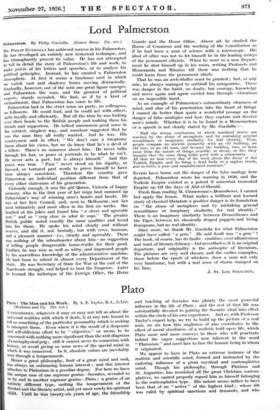Lord Palmerston
- •
Ms. PHILIP GUEDALLA has achieved success in his Palmerston.
He has developed an entirely new historical technique, and has triumphantly proved its value. He has not attempted to tell in detail the story of . Palmerston's life and work, to make précis of his letters and speeches, or to analyse his political principles. Instead, he has created a Palmerston atmosphere. At first it seems a luminous mist in which we watch vast and shadowy forms moving distractedly. Gradually, however, out of the mist one great figure emerges, and Palmerston the man, and the greatest of political tsperts, stands revealed. We find, as if by a kind of enchantment, that Palmerston has come to life.
Palmerston had in the strict sense no party, no colleagues, no followers. He could lead, and he could act with others, quite loyally and efficiently. But all the time he was looking over their heads to the British people and making them his friends and supporters. He talked uncommon good sense in the wittiest, simplest way, and somehow suggested that he was the man they all really wanted. And he was. His countrymen said in effect, " We don't care a twopenny damn about his views, but we do know that he's a devil of a fellow. There's no nonsense about him. He never talks through his hat, or poses or pretends to be what he isn't. He never acts a part, but is always himself." And . this praise was . true. ." Pam " never stood on his dignity, or finessed, or tortured past words to prove himself to have been always consistent. Therefore the country gave Palmerston an individual position different from that of every other statesman of his generation.
Curiously enough, it was the girl Queen, Victoria of happy memory, who in the first year of her reign best summed up Palmerston's way of winning men's hearts and heads. He was at her first Council, and, next to Melbourne, saw her most intimately and most often in the first six weeks. She laughed at his jokes and found him " a clever and agreeable man" and so " very clear in what lie says." The greater British public noted exactly the same qualities and loved him for them. He spoke his mind clearly and without reserve, and did, it, not brutally, but with verve, humour, m and a pleasant manner—i.e., clearly and agreeably. There was nothing of the schoolmaster about him—no suggestion of telling people disagreeable home-truths for their good. Further, he was wise as well as witty, and impressed people by his marvellous knowledge of the administrative machine. He had been to school in almost every Department of the State. He was Secretary of State for War at the end of the Napoleonic struggle, and helped to beat the Emperor. Later he learned the technique of the Foreign Office, the horse Guards and the Home Office. Above all, he studied the House of Commons and the working of the Constitution as if he had been a man of science with a microscope. His ideal of office was not to let himself be in the leading strings of the permanent officials. When he went to a new Depart- ment he shut himself up in his room, writing Protocols and Memoranda and Minutes till there was nothing that he could learn from the permanent chiefs.
That he was an arch-bluffer must be granted ; but, at any rate, he always managed to outbluff his antagonists. There was danger in the habit, no doubt, but courage, knowledge and nerve again and again carried him through—victorious on an impossible hand.
As an example of Palmerston's extraordinary clearness of mind, and also of his penetration into the heart of things I cannot do better than quote a wonderful passage on the danger of false analogies and how they capture and deceive men's minds. Whether it is to be found in a Memorandum Or a speech is not clearly stated by Mr. Guedalla :—
" Half the wrong conclusions at which mankind arrive are reached by the abuse of metaphors, and by mistaking general resemblance or imaginary similarity for real identity. Thus, people compare an ancient monarchy with an old building, an old tree, or an old man, and because the building, tree, or man must from the nature of things crumble, or decay, or die, they imagine that the same thing holds good with a community. . . . All that we hear every day of the week about the decay of the Turkish Empire, and its being a dead body or a sapless trunk, and so forth, is pure and unadulterated nonsense."
Events have borne out the danger of the false analogy here depicted. Palmerston wrote his warning in 1839, and the Turkish Empire existed as a potent if somewhat truncated Empire up till the days of. Abd-u1-1-Iamid.
Fresh frqm reading M. Clemeneemis,Demosthenes, I cannot but apply the lesson. What makes a brilliant and learned
study of classical literature a positive danger is its foundation on " the abuse of metaphors and by mistaking general resemblance or imaginary similarity for real identity."
There is an imaginary similarity between Demosthenes and the Tiger, between his classically draped puppets and living Europeans, but no real identity.
Once more, we thank Mr. Guedalla for what Palmerston might have called " a gem." He said Soult was " a gem " The book, of course, has its faults—crudities, over-allusiveness and want of literary delicacy—but nevertheless it is an original departure, and originality is the antiseptic of literature. The pictures are very well chosen, and the earlier examples, those before the epoch of whiskers, show a man not only very handsome, but with a real sense of charm stamped on his face.
J. ST. IJOE STRACHEY.


















































 Previous page
Previous page